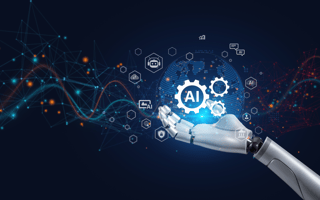Generative AI is changing the way we do everything, from email writing to space exploration. But new technology always comes with new logistical and ethical questions. What do you do, for instance, when people start hitting on your AI scheduling assistant? That was an actual conundrum sent to the popular “Ask A Manager” advice column recently, an entertaining, if concerning, sign that AI’s emerging prevalence is forcing us to ask new and strange questions about how we use technology.
At Sierra Space, an aerospace company working to build a shared ecosystem in space, the questions around using GenAI are broader than the bad human behavior it might expose. The company has experimented with GenAI in everything from rewriting job descriptions to be more inclusive to automating code reviews and writing better verification plans.
“Our investment in generative AI is driven by its potential to enhance our operations, improve our inclusivity, and make our processes more efficient,” said Vice President of Engineering Joe Kopacz.
GenAI’s potential reaches into nearly every sector and process, and its potential to improve and streamline is enormous. But there are also important questions to consider. Joanne Chen, vice president of data at Artera lists several areas where the healthtech company is being particularly cautious, including data privacy, regulatory compliance and bias and fairness.
“Just like any other transformative technology, there are important considerations about GenAI that we must actively address,” she said.
Whether it’s weird employee behavior or serious data privacy issues, GenAI is highlighting plenty of complicated questions. Built In sat down with five tech leaders to hear their inside take on how they’re beginning to answer those questions.
Artera delivers a platform-level patient communications solution that integrates across a health system’s tech stack.
How are you implementing generative AI at your company? What made you decide to invest in this technology?
Investing in Generative AI is a strategic decision that helps advance our health system customers on their digital transformation journey. By implementing GenAI, we can streamline administrative tasks, such as appointment scheduling, billing inquiries and medical record management, as well as personalize every touchpoint in care for a more emphatic, whole-person patient experience.
“Investing in Generative AI is a strategic decision that helps advance our health system customers on their digital transformation journey.”
Our approach is multi-pronged. First, we’re investing in GenAI to develop personalized outreach and virtual assistants — intelligent systems that allow medical staff to interact with patients in a more individualized and efficient way.
Additionally, we’re using GenAI to better understand patients' inbound queries, such as improved multi-language translation and intent mapping. This would unlock the potential of health systems to automate response pathways, enabling streamlined and efficient processes.
Prescription refill, for example, is one of the top requests for patient inbound queries. Correctly mapping this intent would allow our customers to auto-route the requests to the corresponding clinical staff without the need to rely on manual re-routing at the front desk or call center.
Are there any concerns you have about generative AI? If so, what are they, and how are you safeguarding your business against them?
Just like any other transformative technology, there are important considerations about GenAI that we must actively address.
Data privacy and security are one consideration. We take data privacy and security very seriously, implementing robust encryption protocols, access controls and regular security audits. Compliance with data protection regulations is a top priority. We also ensure that the GenAI training processes follow strict guidelines, staying within the domain of fully anonymized information.
Inappropriate content is another concern. Healthcare requires precision. GenAI, however, is inherently bound to make mistakes. We require medical staff to review and approve the patient-facing content before sending it, implementing safeguards to ensure its appropriateness.
Bias and fairness is one more area for consideration. GenAI has brought another layer of complexity to this process. We’re working to develop a guideline to safeguard against it, including regular bias assessment and mitigation as well as active monitoring.
Finally, we need to pay attention to regulatory compliance. The landscape for GenAI regulation is constantly evolving. To safeguard, we closely monitor regulation changes, proactively adjust our practices to ensure compliance and stay informed about industry standards.
How do you think generative AI will shape your industry? How might this transformation affect your company?
I anticipate that we will see rapid adoption of GenAI for some immediate, low-hanging fruit opportunities in healthcare, such as medical record summarization, staff virtual assistant and personalized patient engagement. To unlock its full potential and transform the healthcare industry, a collective effort is needed to establish a robust regulatory foundation for risk management.
Mission Cloud delivers a comprehensive and differentiated suite of agile cloud services designed to help businesses migrate, manage, modernize and optimize their AWS cloud environments.
How are you implementing generative AI at your company? What made you decide to invest in this technology?
GenAI is a game-changing technology that allows Mission to go back and evaluate previous use cases involving chatbots to improve our tier 1 support, allowing us to get answers for customers quickly and efficiently. Mission is also able to offer improved support to customers that can interact with a GenAI chatbot to get simple questions answered quickly and gather information for more complex questions.
Are there any concerns you have about generative AI? If so, what are they, and how are you safeguarding your business against them?
We do not have concerns with GenAI. Mission has set up customers and their internal systems to follow the best data and security practices to ensure that the system is safe and secure. AWS has significant tools to secure your environment and there are multiple ways to protect your data.
How do you think generative AI will shape your industry? How might this transformation affect your company?
GenAI is going to improve the efficiency of our business by helping with repetitive tasks and improving customer experiences. GenAI tools for creating code will make it easier to develop software and create unit tests. The support teams are excited to have more efficient ways to get answers to customers' questions.
“GenAI is going to improve the efficiency of our business by helping with repetitive tasks and improving customer experiences.”
We are developing systems for our marketing team to generate image content. GenAI will make our business more efficient, leading to a variety of transformations. This will allow people to do more interesting work and automate out repetitive tasks.
Xero offers a suite of online accounting software for small businesses, accountants, and bookkeepers.
How are you implementing generative AI at your company? What made you decide to invest in this technology?
We’ve always been committed to innovation in order to help businesses streamline time consuming and manual processes while delivering useful and timely insights to help them make more informed decisions. AI is a core technology that delivers on this commitment and already powers many of Xero’s products.
We've been experimenting with how Generative AI can help our customers find the information they need through seamless conversational interfaces. Investing in GenAI was a straightforward decision; we're always looking to give our customers new ways to engage with our product and their finances.
“Investing in GenAI was a straightforward decision; we're always looking to give our customers new ways to engage with our product and their finances.”
More broadly, our approach to AI, is focused on four key areas: helping customers reduce toil and run their businesses more efficiently, while also effectively automating and streamlining repetitive, time-consuming work; delivering the right insights at the right time to help customers thrive; introducing conversational interfaces that can assist customers and improve their experience; and increasing the productivity of our teams so they can deliver items faster for our customers
Are there any concerns you have about generative AI? If so, what are they, and how are you safeguarding your business against them?
The limitations of Generative AI are well documented, particularly the risk of generating content that's not grounded in fact. Like much of the industry, we are working on ways to secure the grounding of these models. This is done in tandem with ensuring we create experiences that help our customers understand the potential shortcomings of these technologies.
We will also continue to use AI in ways that are secure, safe and maintain our responsibility as a trusted platform for our customers.
How do you think generative AI will shape your industry? How might this transformation affect your company?
Whether it's in small business or the technology sector more broadly, one of the most challenging things to do is break the blank sheet of paper and create a first draft. Whether it is writing code or writing communications to customers, Generative AI is going to make it much easier to move from an idea to a working draft. Automating routine tasks, finding insights and shortening the time from idea to finished product, will free small business owners, accountants, bookkeepers and teams to have more time to do what they love.
Retool is a development platform for building business software.
How are you implementing generative AI at your company? What made you decide to invest in this technology?
Retool’s mission is to change the way software is built. Generative AI accelerates that vision, acting as another tool in the toolkit for developers to build software alongside visual programming and code.
Since launching our AI product in September, we’ve gone from 0 to thousands of customers who have shipped AI automations that are used in production every day.
Are there any concerns you have about generative AI? If so, what are they, and how are you safeguarding your business against them?
While most every technology has positives and negatives, we tend to see generative AI (when used thoughtfully) as an opportunity, especially for developers. AI has actually been quite an accelerant for our business. First, Retool has become the platform for enterprises to integrate AI with their data sources. Second, Retool has seen widespread usage by leading AI companies as a critical part of the LLM ops stack. Third, creating a multi-modal programming environment combining natural language, visual programming and code has opened up the speed and accessibility of software development on Retool.
“AI has actually been quite an accelerant for our business.”
How do you think generative AI will shape your industry? How might this transformation affect your company?
AI is not going to replace engineers. While copilots can give engineers leverage to build faster, the role of engineers to deeply understand real business problems and solve them will only become more important.
Sierra Space is building a shared ecosystem in space for scientific collaboration and innovation to benefit life on earth.
How are you implementing generative AI at your company? What made you decide to invest in this technology?
Our team is actively exploring how we responsibly implement AI, and we have already seen tremendous success. We’ve implemented generative AI to review and rewrite our job descriptions to create more inclusive language. This has fostered a more diverse range of applicants, which is a significant step toward our goal of fostering a more inclusive workplace.
In addition to enhancing inclusivity, generative AI is also making information more accessible within our company. Instead of manually going through thousands of pages of documentation, our team members can now interact with an AI expert to quickly find relevant information, best practices or summaries of large data sets. This has significantly reduced the time spent on information retrieval, allowing our team to focus more on strategic tasks.
Our engineering team is also benefiting from generative AI through automatic code reviews. Similarly, our manufacturing team is using generative AI to optimize our processes, while our systems engineering team is leveraging it to write better requirements and verification plans.
Our investment in generative AI is driven by its potential to enhance our operations, improve our inclusivity, and make our processes more efficient. We are excited about the possibilities this technology holds for our company and the industry.
“Our investment in generative AI is driven by its potential to enhance our operations, improve our inclusivity, and make our processes more efficient.”
Are there any concerns you have about generative AI? If so, what are they, and how are you safeguarding your business against them?
Like any new technology, generative AI comes with its own set of concerns. One of the primary concerns is the potential for misuse, such as generating misleading or biased information, which can occur if the AI is trained on skewed or incomplete data.
To safeguard our business against these potential pitfalls, we are taking a proactive, cross-functional approach. We have teams from cybersecurity, engineering, human resources, internal audit, IT and legal working together to assess and mitigate the risks associated with generative AI. This collaborative approach ensures we consider all potential risks from various perspectives and implement comprehensive safeguards.
One of the key principles that I constantly reinforce with our AI practitioners is the concept of responsibility. While AI can automate many tasks and processes, it is crucial to remember that humans are ultimately responsible for how this technology is used. We are not at a stage where we can completely relinquish control to AI; we must keep our hands on the wheel and our eyes on the road.
We recognize the potential concerns associated with generative AI, and we are taking proactive steps to mitigate these risks and ensure that we use this technology responsibly and ethically.
How do you think generative AI will shape your industry? How might this transformation affect your company?
Generative AI has the potential to significantly transform the aerospace industry. It can automate and enhance various processes from design and manufacturing to data analysis and decision-making, leading to increased efficiency, accuracy and innovation.
For our company, this transformation could lead to significant benefits. By automating and enhancing our processes, we can increase our efficiency and accuracy, reduce costs and accelerate innovation, giving us a competitive edge in the market, enabling us to provide better products and services to our customers.
However, this transformation also presents challenges. As mentioned, there are concerns about the potential misuse of generative AI, and we need to ensure that we use this technology responsibly and ethically. We also need to invest in training our staff to work with generative AI and adapt to new ways of working.
While AI presents significant opportunities for the aerospace industry and our company, it also requires careful management and responsible use. We are excited about the potential of this technology and are committed to leveraging it in a way that benefits our company, our customers and society.















